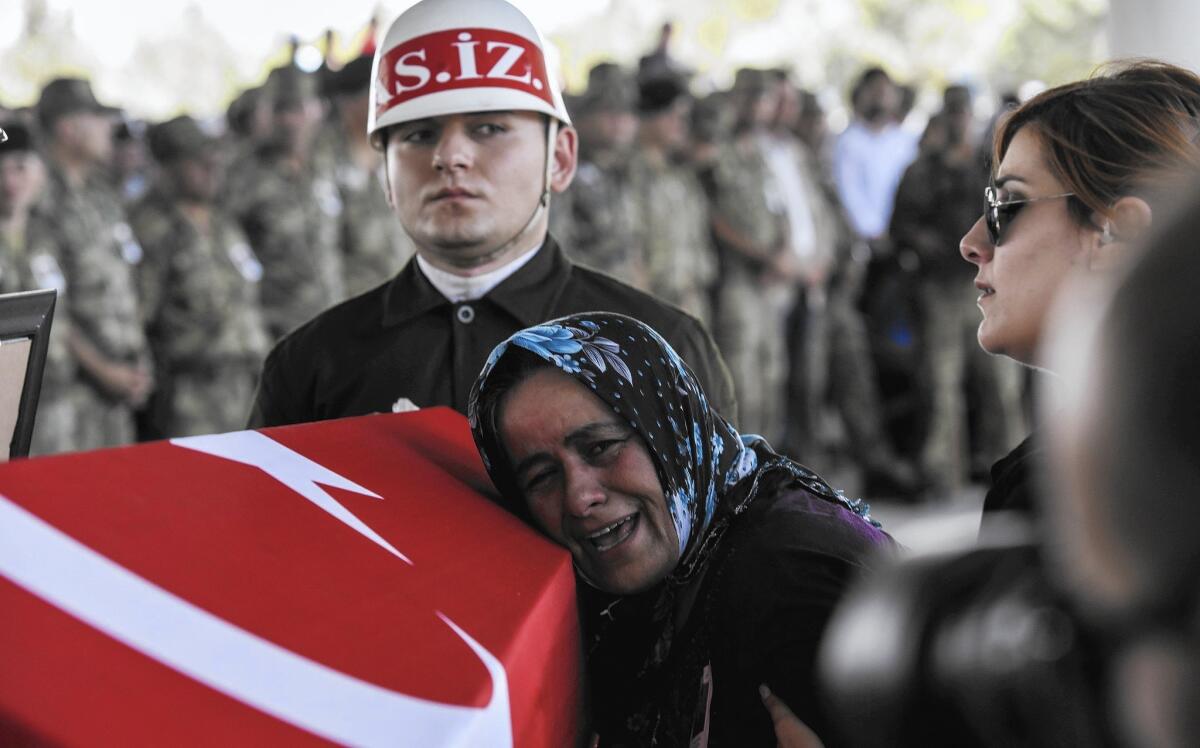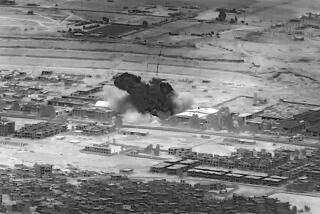With airstrikes, Turkey joins regional clashes

Reporting from Beirut — Turkey has long been a reluctant partner in the U.S.-led campaign against Islamic State militants. Since the U.S. first launched airstrikes in Iraq nearly a year ago, leaders in Ankara had refused to join in, and until this week, had barred coalition warplanes from even using Turkish air bases to mount attacks in neighboring Syria.
Then came Turkey’s announcement Friday that it had unleashed a string of high-profile aerial strikes against the extremist group, the vanguard of what President Recep Tayyip Erdogan said would be a series of operations that “will continue decisively in the future.”
Turkey also launched a renewed series of strikes on the outlawed Kurdistan Workers’ Party, or PKK, a frequent target in the past.
One thing was clear: Turkey, like it or not, has been drawn bit by bit into the war to determine the future of its neighbors in Iraq and Syria — though there are doubts, still, about how significant that role will be.
“Whether Ankara likes it or not, after a long period of hesitation and ambiguous posturing, Turkey has been dragged into the fight,” columnist Joost Lagendijk wrote in Today’s Zaman, an English-language Turkish newspaper.
Friday’s airstrikes appear to have been in retaliation for a militant attack on a Turkish border outpost a day earlier that left one soldier dead and two wounded. Turkish authorities also announced a nationwide roundup of almost 300 terrorism suspects, including some accused of being Islamic State operatives.
Turkish police have blamed Islamic State for a suicide bombing Monday in the largely Kurdish southern border town of Suruc that left 32 dead and more than 100 wounded. Spontaneous demonstrations erupted across Turkey condemning both the attacks and what is seen as the government’s indulgence of Islamist militants operating along its long border with Syria.
The bombing seems to suggest that the battle between Islamic State and Kurdish militia members may be spreading north from Syria into Turkish territory, a potentially ominous development for the government in Ankara.
Until now, Turkey’s commitment to fight the Islamist extremists has been constrained by other security concerns, including the expansion of ethnic Kurdish authority in northern Syria and the punishing war that continues to rage in Syria with no end in sight.
The aerial strikes, announced with considerable fanfare by Turkish officials, came as Erdogan confirmed an agreement to allow expanded U.S. use of the strategic Incirlik air base. U.S. officials had long sought expanded access because of the base’s proximity to Islamic State positions in Syria and Iraq.
Turkish authorities have heatedly denied allegations that they have abetted Islamic State and other militant groups in Syria. But militant recruits, arms supplies and black market oil have regularly crossed the border.
Turkey, NATO’s eastern bulwark, has a huge army and air force and is probably in the best strategic position to deal a decisive blow to Islamic State and other militant factions operating in Syria. But worry about Kurdish territorial gains and being dragged directly into Syria’s civil war left Ankara largely on the sidelines. That has left officials in Washington, London and other capitals privately fuming at their NATO ally.
Whether the crackdown on militants augurs a broader and more protracted campaign against Islamic State remains to be seen. Even Turkey’s decision to allow U.S. forces to use the Incirlik base came with a significant qualification. In his comments, Erdogan emphasized that Turkey insisted the air base be utilized “within a certain framework,” without elaboration.
The comments ignited speculation that Turkey is insisting that sorties from the base not be used in support of Syrian Kurdish militia members who have received massive U.S. air cover in their campaigns in Syria against Islamic State. Turkish officials regard the major Syrian Kurdish militia as a proxy for the PKK, which has waged a more than three-decade battle against the Turkish state.
Many Turkish leaders clearly view the threat of ethnic Kurdish expansion in northern Syria as a more grave concern than Islamic State. Turkish officials have been outraged to see U.S. warplanes and drones acting as a de facto air force for Kurdish militia members allied with the PKK.
In addition to the attacks on Islamic State, Turkey also announced strikes on PKK targets in Iraq — positioning Washington, which has used airstrikes to aid pro-PKK Kurds fighting Islamic State in Syria, between two key allies, the Kurds and the Turks.
For most of the last four years, Turkey’s major foreign policy goal has been toppling the government of Syrian President Bashar Assad. Critics, including Vice President Joe Biden, have said Ankara largely ignored the militant threat metastasizing in Syria as Turkey’s official policy focused on aiding the now Islamist-dominated armed opposition fighting to oust Assad.
“For Turkey, ISIS is a problem that needs to be managed — I don’t think they see it as an existential threat,” said Howard Eissenstat, a Turkey expert at St. Lawrence University in New York state, using an abbreviation for Islamic State. “For them, the central issues remain the Syrian civil war writ large, and what they see as the aggrandizement of” Syrian Kurdish fighters whom Ankara views as PKK proxies.
The Pentagon has clearly come to view the Kurdish fighters in Syria as a rare and reliable ally on the ground in the fight against Islamic State.
From the Turkish government’s perspective, however, the increasing territorial reach of the Syrian Kurdish militias is a matter of grave concern, a de facto strategic advance for the PKK. The outlawed group said it had killed two Turkish police officers this week in retaliation for the bombing in Suruc, a largely Kurdish town, in what appeared to be a rupture of a PKK cease-fire.
Times staff writer W.J. Hennigan in Washington contributed to this report.
Twitter: @mcdneville
More to Read
Sign up for Essential California
The most important California stories and recommendations in your inbox every morning.
You may occasionally receive promotional content from the Los Angeles Times.








